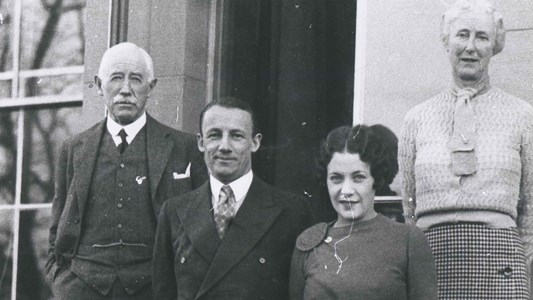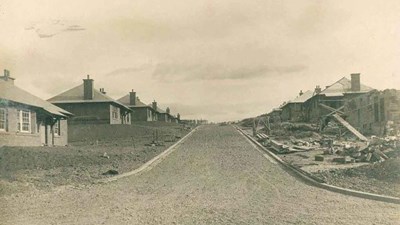A K Bell and the Gannochy Trust
Arthur Kinmond Bell, known as ‘A K' was the right man in the right place at the right time. His vision for his philanthropic pursuits was ahead of its time and shaped the nature of the Gannochy Trust and the benefits that it has brought to Scotland.
His father, Arthur Bell, developed the whisky business known eventually as Arthur Bell and Sons in the latter half of the 19th Century so that A K had a firm foundation on which to build his Company based in Perth. There were tremendous opportunities at that time for a man such as A K, with his attributes of energy and business acumen.

Towards the end of the 19th Century a number of factors contributed to the expansion of the whisky industry in Scotland. The invention of the patent Coffey Still enabled near neutral grain whisky to be produced economically in a continuous process, rather than by the batch process by which malt whisky was produced. Malt whisky was a production of the pot still, a bulbous copper work of art that is clearly visible in any malt distillery. The blending of the grain whisky with malt whiskies produced a lighter product than the heavier single malts, which was more acceptable to wider and emerging markets, and capable of being produced in large quantities on a consistent basis.
The dreaded phylloxera insect devastated the French vineyards limiting the production of wine, and consequently the ability to produce Cognac. The reduced supply, particularly of Cognac, helped to open the market in England for the Scotch whisky industry, and this subsequently spread to all parts of the world.
Improved communications by rail and sea and the organisation of industries on a national scale came at an opportune moment for the Scotch whisky industry, which assisted it to expand significantly from its ‘cottage industry' origins.
A K Bell prospered despite setbacks such as the reduction of exports to the USA due to prohibition, and like other Scots before him - Andrew Carnegie and Thomas Lipton - he decided to embark on philanthropic ventures. There were many opportunities for the philanthropist in post-war Britain, especially as the Great Depression had hit hard and the welfare state was in its infancy.
 AK Bell's first major philanthropic project was building the Gannochy Housing Estate between 1924 and 1932. His aim was to provide inexpensive rented accommodation for the artisans of Perth and other deserving people in the area. It was a model scheme whose character is maintained to this day.
AK Bell's first major philanthropic project was building the Gannochy Housing Estate between 1924 and 1932. His aim was to provide inexpensive rented accommodation for the artisans of Perth and other deserving people in the area. It was a model scheme whose character is maintained to this day.
It was ideally situated next to the countryside and all of the living rooms enjoyed a south-west aspect. A K Bell oversaw the unique project personally, insisting that adjacent houses were not identical; most houses had an octagonal window somewhere in the design and a rowan tree in their sizeable gardens. The Estate had extensive beech hedging - a characteristic of Perthshire - which is maintained meticulously by the Trust's Estates Team each autumn.
He also bought Scone Den, known as Quarrymill, for the benefit of the people of Perth. It was developed into Quarrymill Woodland Park, in conjunction with the then Countryside Commission (now Scottish Natural Heritage) and District Council, and is enjoyed by residents and visitors alike. The Trust also built the shop at Quarrymill, which was originally a workshop for Upper Springland. It is now operated as a coffee shop by the Macmillan Coffee Shop Association, and their proceeds are donated each year to the local Cornhill House who provide support to those associated with cancer.
There were many other early benefactions, but the most significant event was the founding of the Gannochy Trust in 1937, five years before his death in 1942. In doing so, A K Bell ensured that his philanthropy, supported by his personal fortune, would continue to support charitable projects well into the future.
And so the Trust was born and began to benefit Perth and its environs; Trust funds initially comprised shares in the Bell's whisky company and were latterly spread prudently and wisely over a wide spectrum of investments, which have grown significantly over the years. In 1967, with increasing funds available, the geographical footprint of the Trust's donations was widened with the approval of the Court of Session from Perth and its immediate surrounds to encompass the whole of Scotland.
Many of A K Bell's early projects were visionary. He took a keen interest in Perth's water supply and as early as 1925 commissioned a survey to establish the steps necessary for its improvement. The reduction of sewage into the River Tay was clearly a major factor and the Gannochy Trustees were given a large consignment of Bells shares for the specific purpose of building a sewage treatment plant for Perth, and for improving the sewage schemes in Luncarty, Stanley, Almondbank and Stormontfield. The Perth project was completed at Sleepless Inch just outside the city in 1971, the Trust contributing over £600,000 towards the cost of the project. In addition, the Trust also provided almost £40,000 towards the smaller schemes in the outlying villages.
A K Bell gave the Trustees provision to enlarge the Housing Estate, and this was done in three phases in the 1970/80/90s when sixty three smaller houses were built for older people. These houses are usually occupied by former tenants of the larger houses when the upkeep of the house and garden become too much of a burden. These houses are termed ‘sheltered' as a management service is provided. They are also deemed to be charitable, and the Trust has a clear policy for allocating them based on an established criteria.
It would be incorrect to assume that all of the Trust's donations are substantial or are awarded to highly significant projects. Many donations are awarded to small deserving charities, many in remote parts of Scotland, to whom the Trust provides a lifeline.
It is the aim of the Trustees to invest wisely in order to make donations to charitable projects and meet the purpose of A K Bell's visionary Trust Deed which was set out in 1937.
A K Bell also provided a fine cricket ground at Doo'cot Park and an iconic ‘arts & crafts'-style Edwardian pavilion. A K Bell was a keen cricketer, representing his country on many occasions and it is recorded that he scored a century at the age of 55! He was well known in international cricket circles, and shared a long-lasting personal friendship with the famous Australian batsman Sir Donald Bradman. There are many photographs of A K and Sir Donald, and their respective wives, at several beauty spots around Perth. The photograph at the top of the page shows (left to right) A K Bell, Sir Donald Bradman, Lady Bradman and Mrs Camilla Bell.
A K Bell was presented with the Freedom of Perth on 18th March, 1938 in 'acknowledgement and recognition of the many benevolent and public services rendered by him to his Native City, more particularly in the maintenance and development of industry of the City, the provision of housing accommodation and of facilities for the recreation of the Citizens and in testimony of the high respect and esteem in which he is held by the Magistrates, Council and Citizens.'